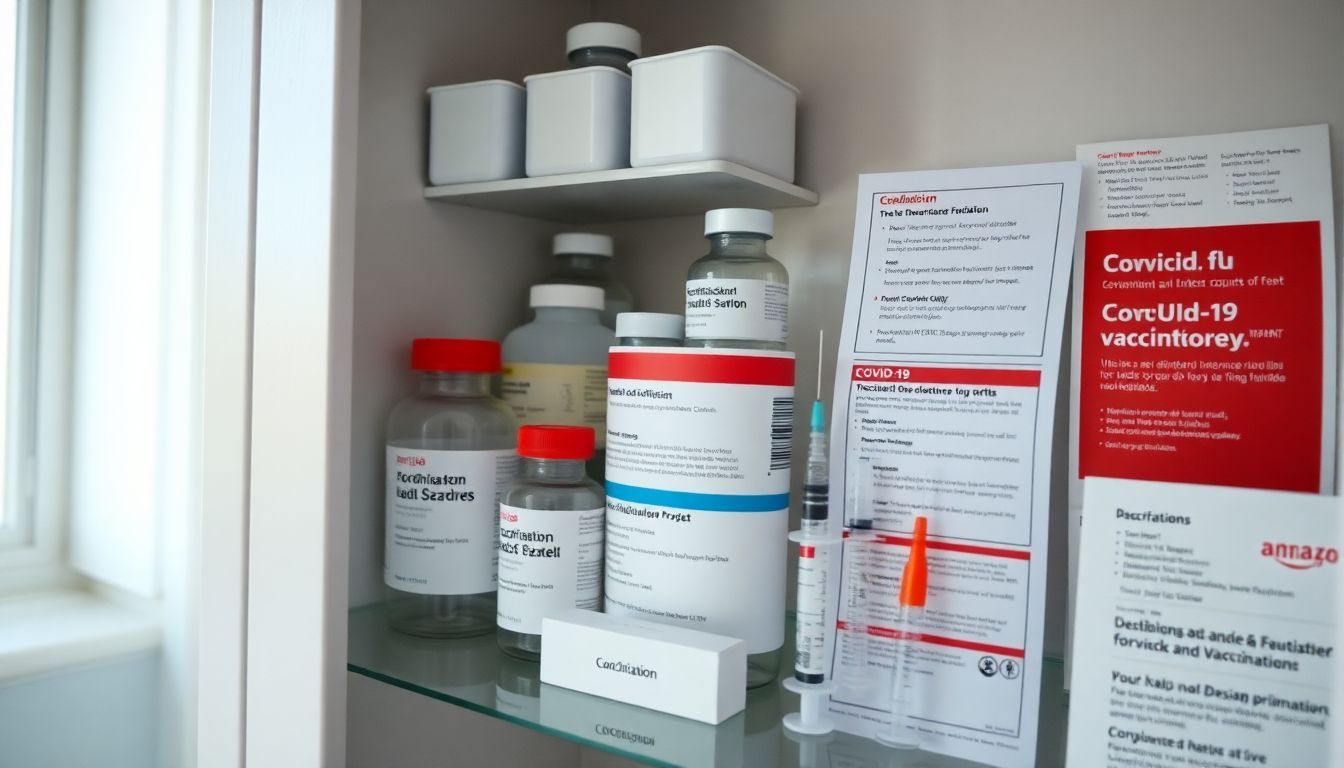The flu season and COVID-19 continue to pose risks for many people. Vaccines help lower the chances of severe illness from these viruses. This guide will explain why flu and COVID-19 vaccinations matter, how they work, and who should get them.
Thank you for reading this post, don't forget to subscribe!Stay healthy—read on!
Key Takeaways
- Vaccines reduce the risk of severe illness. Flu shots cut doctor visits by 40-60%, and COVID-19 vaccines lower hospitalizations, especially for high-risk groups like older adults and those with chronic diseases.
- Get flu shots in September or October before flu season peaks from December to February. COVID-19 boosters can be taken at the same time for added protection.
- Booster doses maintain strong immunity against new variants like Omicron. The CDC recommends them for older adults, pregnant women, and people in long-term care facilities during respiratory virus season.
- Everyone aged 6 months and older should get vaccinated annually for the flu and stay up-to-date on COVID-19 vaccines per CDC guidelines to build herd immunity and cut virus spread in communities.
- Vaccines are safe after clinical trials on thousands of people, including high-risk groups. Common side effects include mild arm pain or fever that disappear in 1–2 days.
Importance of Vaccinations for Flu and COVID-19
Vaccines keep your body strong against flu and COVID-19. They help lower the chance of getting very sick or needing hospital care.
Significance of maintaining health and preventing serious illness
Getting vaccinated boosts the immune system and reduces the risk of severe illness. COVID-19 vaccines also lower chances of hospitalization, especially for high-risk groups like older adults or those with heart disease and lung conditions.
Flu vaccines protect against multiple flu strains each year, keeping people healthier during flu season.
Preventing serious illness saves lives and reduces strain on healthcare systems. For example, CDC data shows that flu vaccinations reduced doctor visits by 40-60% in recent years. Staying healthy helps avoid complications such as long COVID or respiratory infections from viruses like RSV (respiratory syncytial virus).
Timing of flu and COVID-19 vaccinations
Flu season peaks between December and February, but vaccines work best when given earlier. Experts recommend getting the flu vaccine in September or October. This timing allows the immune system to build enough protection before viruses become widespread.
COVID-19 vaccines, including boosters, can be taken alongside the flu shot. The CDC says it’s safe to receive both at once. Doing so saves time and provides strong defense during colder months when respiratory viruses like influenza (flu) spread more easily.
COVID-19 Vaccine
The COVID-19 vaccine helps protect against severe illness caused by the virus. It strengthens your immune system to fight off infections more effectively.
Protection against severe illness and hospitalization
COVID-19 vaccines protect the immune system from serious harm. They lower the risk of severe illness and hospitalization by boosting antibody protection. High-risk groups, like older adults or those with chronic conditions, benefit the most.
Hospital stays drop significantly with vaccination. Even against new COVID-19 variants, vaccines continue to help people avoid lung infections and breathing trouble. Vaccination is key for disease prevention during respiratory virus season.
Potential need for booster shots
Booster shots help keep immunity strong against new COVID-19 variants. Viruses change over time, making updates to vaccines necessary. For example, the bivalent booster targets both the original virus and newer strains like Omicron.
The Centers for Disease Control and Prevention (CDC) recommends boosters for high-risk groups, older adults, and those with chronic health conditions.
Antibody protection from the initial vaccine may fade after months. Booster doses restore this defense, lowering the risk of severe illness or hospitalization. Pregnant women and individuals in long-term care facilities also benefit greatly from staying up-to-date on their vaccine schedule during respiratory virus season.

Effectiveness of Flu Vaccines
Flu vaccines help lower your chances of getting sick during flu season. They also protect people with weaker immune systems, like older adults or those with chronic illnesses.
Statistical data on reducing the risk of illness
Vaccines play a crucial role in keeping people healthy, especially during peak flu seasons. Here’s how flu vaccines reduce the risk of illness based on statistical data:
| Category | Data |
|---|---|
| Risk Reduction | 40% to 60% decrease in flu-related illness during peak seasons |
| Severe Cases Avoided | Significant reduction in hospitalizations linked to the flu |
| Population Impact | Millions protected annually by flu shots |
| Health Authority Guidelines | Recommended for everyone aged 6 months and older |
This data highlights the effectiveness of flu vaccinations as a preventive measure, especially during high-risk periods. It underscores their value in protecting public health.
Recommendations from health authorities
Health authorities like the CDC advise everyone over six months old to get flu and COVID-19 vaccines. These vaccines help prevent severe illness, especially for older adults, pregnant women, and people with chronic medical conditions like heart disease or lung problems.
Flu shots should be taken annually before flu season peaks in winter. COVID-19 boosters are recommended for ongoing protection against new variants. Local health departments, pharmacies, and doctors make getting vaccinated quick and easy—protect yourself now to support herd immunity in your community!
Role of Vaccines in Achieving Herd Immunity
Vaccines help reduce how fast viruses spread in groups. They protect people who can’t get vaccinated by lowering infection risks.
Reduction of virus spread in communities
Vaccination helps reduce the spread of respiratory viruses, including COVID-19 and influenza. These vaccines strengthen your immune system by boosting antibody protection, lowering your chances of infection.
Fewer infections in a community mean fewer opportunities for the virus to grow and evolve into severe forms or new variants.
High vaccination rates contribute to population immunity. This protects high-risk groups like older adults, pregnant women, and those with heart disease or lung disease. Vaccines also help prevent hospitals from overcrowding during flu season or after COVID-19 spikes by limiting virus circulation.
Safety and Process of Obtaining Vaccinations
Vaccines go through strict testing to ensure they are safe—visit your doctor or local pharmacy to get vaccinated today.
Clinical trials and monitoring for side effects
Clinical trials ensure vaccines are safe and effective. They test how well a vaccine works and check for side effects.
- Researchers test COVID-19 and flu vaccines on thousands of people in clinical trials. These include diverse groups, like older adults or individuals with heart disease, to cover high-risk groups.
- Trials confirm the safety and effectiveness of vaccines before the FDA approves them. For example, the Moderna vaccines passed all required phases.
- Monitoring continues after approval to track rare side effects. The Centers for Disease Control and Prevention (CDC) ensures this through reporting systems.
- Common mild side effects include arm pain, tiredness, or a slight fever. These usually go away in 1-2 days.
- Serious reactions happen rarely but are closely studied during trials and monitoring periods for COVID-19 infections and influenza virus prevention.
- Pregnant women or those in long-term care facilities are often included in studies to ensure wider protection across different groups.
Next, learn how to get vaccinated at local doctors’ offices or pharmacies safely!
Obtaining vaccinations through local health departments, doctors, or pharmacies
Getting vaccinated is easy and helps protect against serious illnesses. Many options are available to make the process simple and convenient.
- Visit your local health department for free or low-cost flu and COVID-19 vaccines. They often provide information on vaccine availability during the respiratory virus season.
- Schedule an appointment with your doctor for personalized advice. This is especially helpful for high-risk groups like pregnant women, older adults, or those with lung or heart diseases.
- Walk into most pharmacies to receive vaccinations without long waits. Pharmacies like CVS and Walgreens offer flu shots, RSV vaccines, and COVID-19 boosters daily.
- Check availability online through tools offered by the Centers for Disease Control and Prevention (CDC). These sources can guide you to nearby locations offering quadrivalent influenza vaccines or COVID-19 shots.
- Use community clinics during seasonal influenza peaks. Clinics help ensure people in all areas stay immunized and ready to face emerging variants during flu season.
- Ask about mobile vaccination programs if traveling is difficult. These services cater to individuals in long-term care facilities or those with mobility issues.
Vaccines can be accessed almost anywhere today with a little planning!
Consultation with Healthcare Providers
Talk to your healthcare provider about the vaccines. They can guide you based on your health needs—learn more!
Personalized advice based on health history
Healthcare providers review your health history to guide vaccine choices. They consider conditions like lung disease, heart disease, or pregnancy. For older adults or high-risk groups, specific vaccines may be recommended during flu season or the respiratory virus season.
Some vaccines, like quadrivalent vaccines for influenza A viruses and B strains, target broader protection. Pregnant women might get advice on flu and COVID-19 vaccination to lower risks of preterm delivery or severe illness.
Consult your healthcare provider to match treatments with your needs—like antiviral medications if needed for added defense.
Mild side effects and their duration
Soreness at the injection site is common after a flu or COVID-19 vaccine. It usually goes away within a few days.
Some people may experience a mild fever. This side effect is short-lived and often resolves itself quickly. These are normal signs that your immune system is building protection against respiratory viruses like influenza b and COVID-19 variants.
Conclusion
Vaccines protect you and those around you. Getting flu and COVID-19 shots can save lives, especially during peak seasons. Talk to your doctor about the best time for vaccinations. Stay healthy by taking this simple step—your future self will thank you!
